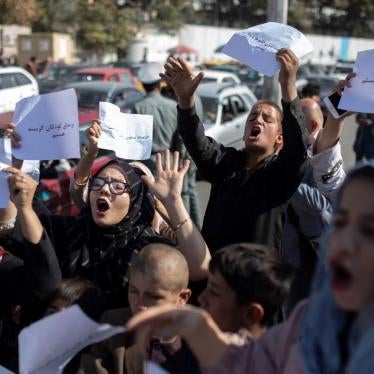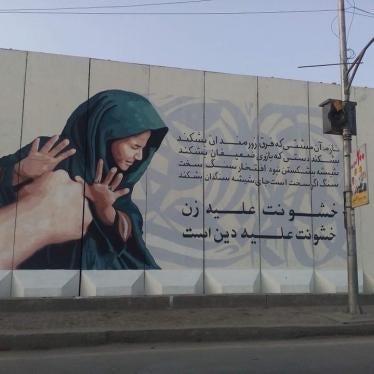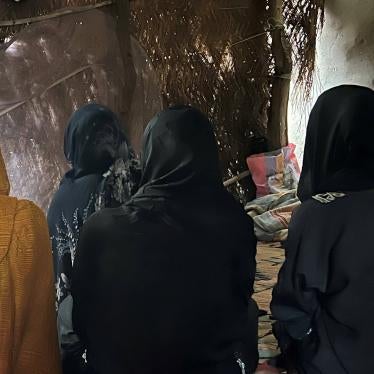We congratulate Mr. Sinirlioğlu on his appointment to this role and welcome the opportunity to share our recommendations as you undertake this important assessment.
We note that the United Nations Security Council has requested that the assessment “provide forward-looking recommendations for an integrated and coherent approach among relevant political, humanitarian, and development actors” to address the current challenges in Afghanistan including but not limited to “human rights and especially the rights of women and girls.”
The situation in Afghanistan at present is the most serious women’s rights crisis in the world. As you are no doubt aware, the Taliban have stripped Afghan women and girls of most of their rights. Taliban abuses include banning girls and women from education above a sixth grade level, banning women from most employment, imposing severe restrictions on the ability of women and girls to travel and even leave their homes, banning women and girls from competitive sport, completely dismantling the system that had been developed to respond to gender-based violence, and a brutal crackdown including the torture and ill-treatment of women who have protested against these abuses.
The ban on women’s employment includes a ban on Afghan women working for international nongovernmental organizations (NGOs) and for the UN. These bans have had the effect of cutting many women and girls off from desperately needed humanitarian assistance in a context where 28.8 million Afghans are in need of food aid. According to OCHA, “The series of restrictions levied on women is exacerbating existing vulnerabilities faced by women and girls as well as women-headed households. Recent data shows that 48 per cent of women-headed households have a poor Food Consumption Score (FCS) compared to 39 per cent of male-headed households.”
The Taliban’s crackdown on the rights of women and girls has not ended—it continues to deepen, as evidenced by recent orders including dismissing women from employment in kindergartens and the closure of all beauty salons, which were a major source of the remaining employment for women and a rare space where women and girls could find community and support outside their homes.
The women’s rights crisis in Afghanistan is happening in the context of a broader human rights and humanitarian crisis, with many other abuses as well as severe hardship for much of the population. Most Afghan humanitarian NGOs—including those headed by women, and those specifically seeking to reach women and women-headed households—lack funding to continue their work. The World Food Program has had to cut eight million food-insecure Afghans from receiving assistance entirely. While the establishment of the Afghan Trust Fund alleviated some banking problems, serious problems remain, with the result that humanitarian groups, local businesses, and individuals cannot conduct bank transfers.
The Taliban’s crackdown has decimated the media. Journalists and others perceived to be critics, including among others the education activist Matiullah Wesa, have been jailed without due process. Torture of detainees is commonplace. The Taliban have targeted for abuse lesbian, gay, bisexual, and transgender (LGBT) people and often forced them into hiding.
The armed group Islamic State of Khorasan Province continues to carry out deadly attacks targeting civilians. Their widespread attacks on the Shia and Hazara communities constitute crimes against humanity.
Based on the current situation, we would like to outline some approaches that should guide this process:
- The independent assessment team should include experts on human rights, especially the rights of women and girls.
These experts should be involved in every aspect of the assessment, including consultation with victims and survivors of human rights violations, and in preparing the assessment’s outputs.
- The independent assessment team should consult widely with people directly affected by human rights violations, especially women and girls.
The terms of reference for the assessment call for “consultations with all relevant Afghan political actors and stakeholders, including relevant authorities, Afghan women and civil society, as well as the region and the wider international community.” As part of this process, the team should hear from people who have personally experienced human rights violations, and the family members of victims, such as relatives of those arbitrarily detained, attacked or extrajudicially killed. The team should actively seek to consult with women’s rights defenders including women who have participated in public protests against Taliban abuses. They should also hear from members of the Hazara and Shia communities, and other minority communities, LGBT Afghans, journalists including women journalists, and local Afghan-led humanitarian NGOs providing health and food assistance.
It is important that the assessment team not hear solely from civil society members hand-picked by the UN. While the UN has a valuable role to play in convening consultations, some human rights defenders have raised concerns with Human Rights Watch about the UN shutting out of consultations with more outspoken activists, for example women’s rights protesters, and neglecting some groups such as LGBT people.
- The independent assessment process and its outputs should be transparent.
There has been considerable concern among Afghan human rights activists, especially women’s rights defenders, about the conduct of the assessment and the recommendations it might produce. A transparent process could help to allay some of these fears, and Afghan women and civil society activists deserve to know what the assessment recommends and to see their perspectives, concerns and recommendations informing the broader political strategy of the international community in Afghanistan. We suggest you do the following:
- Make a broad and public call for submissions, with a suggested framework for information that would be helpful to the team and do outreach to ensure that Afghans inside and outside of the country are aware of this call and can respond to it.
- Ensure that the full report is presented, in open session, to the Security Council by November 17, 2023.
- The assessment report and its recommendations should have a central focus on human rights, especially the rights of women and girls.
The independent assessment should make improving the human rights situation, and ensuring accountability for all human rights violations, a major priority, and all recommendations should be compatible with that goal. In that regard we suggest that the report should make the following recommendations:
- Renewal of the mandate of the Special Rapporteur on the human rights situation in Afghanistan (Special Rapporteur on Afghanistan), with additional resources provided to the Special Rapporteur’s team if he identifies additional needs.
- Establishment of a dedicated mechanism by the UN Human Rights Council, with a mandate to investigate and collect and preserve evidence of all grave rights violations and abuses committed in Afghanistan, including before August 2021, and to advance accountability, alongside the mandate of the Special Rapporteur on Afghanistan, at its upcoming 54th regular session.
- Full implementation, by the Taliban, states, and the UN, of the recommendations of the June 2023 joint report by the Special Rapporteur on Afghanistan and the Working Group on discrimination against women and girls.







